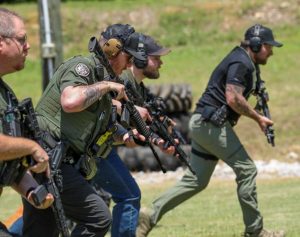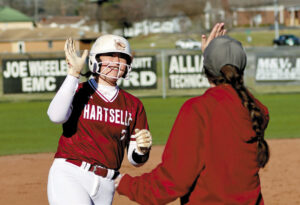On the Front Lines: Husband-wife team provide paramedic service
Photos by Jeronimo Nisa and contributed
Chris and Rebecca Hill have a unique situation on the job – one Chris said he’s never seen before in his more than 10 years as a paramedic for First Response Ambulance. The Hills, a Danville couple, are a husband-and-wife team who work together on an ambulance. They often work 24–hour shifts together, with little time for breaks.
Three years ago, when Chris’ previous partner left the company, Chris met Rebecca when she joined as an EMT. They became fast friends and worked well together and eventually began spending time with each other outside of work. “We would go out and watch a movie or something just because we enjoyed being around each other,” Rebecca said.
“When you’re around someone for 24 hours straight, you get to know them and talk about everything, no matter how personal it is. You know, there’s no boundaries,” Rebecca added. The pair even joked about their love lives and troubles with online dating, all the while slowly realizing the person sitting opposite would make a good partner when off duty as well.
Their relationship added a romantic component after some persuasion. Chris said he was afraid of “messing up a good thing” and was still healing from a bad breakup. Once the two started dating, he then wondered whether they could continue working together.
“We’ve come to find out now that as a team, we work so well together that when we work with other people, it’s really difficult,” Chris said.
“I instinctively know what he’s wanting me to do before he says anything,” Rebecca added. “So, everything runs a lot smoother, especially when we’ve got a difficult call. The other side of it is, when we do have a difficult call, we can talk to each other about it, which makes it easier for us to unwind from it. If there’s something a little bit more traumatic or a little bit worrisome, we have each other to lean on.”
“And as you know, if you’ve got a partner that’s not in the same sort of field as you, it can be very hard for you to go home and for them to understand why you’re exhausted and you don’t feel like going out or going to the movies – or it’s hard for them to believe you when you’re working late,” Chris added. “So, for us, we never have those issues.”
Chris has a military background, serving 10 years in the U.S. Army before he was medically discharged after an injury. He had previously worked in various plants before being laid off and retrained as a paramedic. He said he chose the field because of its stability and because he knew he could put his skills to use helping people in their most critical times. “I’m not worried about the emotions of it; I’m just making sure I do what needs to be done,” he said.
Rebecca, who is originally from England, is a former horseback instructor who pursued her EMT license for insurance purposes while she was teaching lessons. A part-time stint as an EMT eventually led her to her full-time career – and her husband.
“When I came and worked for the company three years ago, I was brand new EMT,” Rebecca said. “I guarantee that when I was back home in England, thinking about what my career would be, I would have never believed in a lifetime that I would be sitting on an ambulance in Decatur, Alabama.
Rebecca said Chris’ experience helped get her up to speed. “Chris has been able to teach me a whole lot, and I feel like I’m constantly learning under him,” she said.
“I enjoy that there’s something I can do to help somebody else because I’m really fortunate,” Rebecca added. “I am very healthy, never have any issues, and being able to actually help somebody that is in crisis can be very satisfying.
“We also form bonds with people too,” she said. “We take our regular people to dialysis appointments, and before the pandemic, we would take some folks out to eat every now and then. We haven’t been able to do that lately. It’s like we are their families in some cases.”
That is just one of the struggles the job presents. Rebecca said at times it is hard to not become despondent when she sees people in need in Morgan County.
“We’ve taken someone who is homeless to the hospital and watched them walk out and call for an ambulance to the next hospital because they want a warm place to stay for the night,” Rebecca said. “Some of those folks and many others don’t seem to understand that they are having what I would call a non–emergency, and we’ve got somebody else down the road that’s having a real emergency, and our resources are already tied up.”
“I sometimes feel like there’s got to be more we can do,” she said. “Is there another service that’s available to help them out? More beds available at a local shelter or resources at the Salvation Army? Something like that or something where they can go because there again it’s a drain, especially at the moment with the pandemic.
“You know when you’ve got these people taking up beds, and then you’ve got people that are in critical condition coming in, and we haven’t got that bed service for critical patients – it makes it hard.”
Chris has worked for several ambulance services in his decade in the field – First Response, he said is a family and is where he is most comfortable serving the community. Having his wife by his side and in the same ambulance plays a big role in that comfort.
“She is like a NASCAR driver,” Chris said with a laugh. As the higher-ranking paramedic, on emergency calls, Chris is tending to the patient while Rebecca makes sure they arrive at the hospital quickly and safely. “She can dodge obstacles all day long, but the people on the road panic. They will pull out right in front of you or overthink and wait until the last minute to change lanes.”
The ongoing COVID-19 pandemic has presented Chris and Rebecca with issues on the job. Chris had the virus right after Christmas, and the pair had to quarantine together. Rebecca has already received the vaccination, and they are both now in good health.
Longer shifts, staffing shortages and overtime are among challenges they have faced during pandemic. Rebecca said she is hopeful for the future and can see the “light at the end of the tunnel.”








